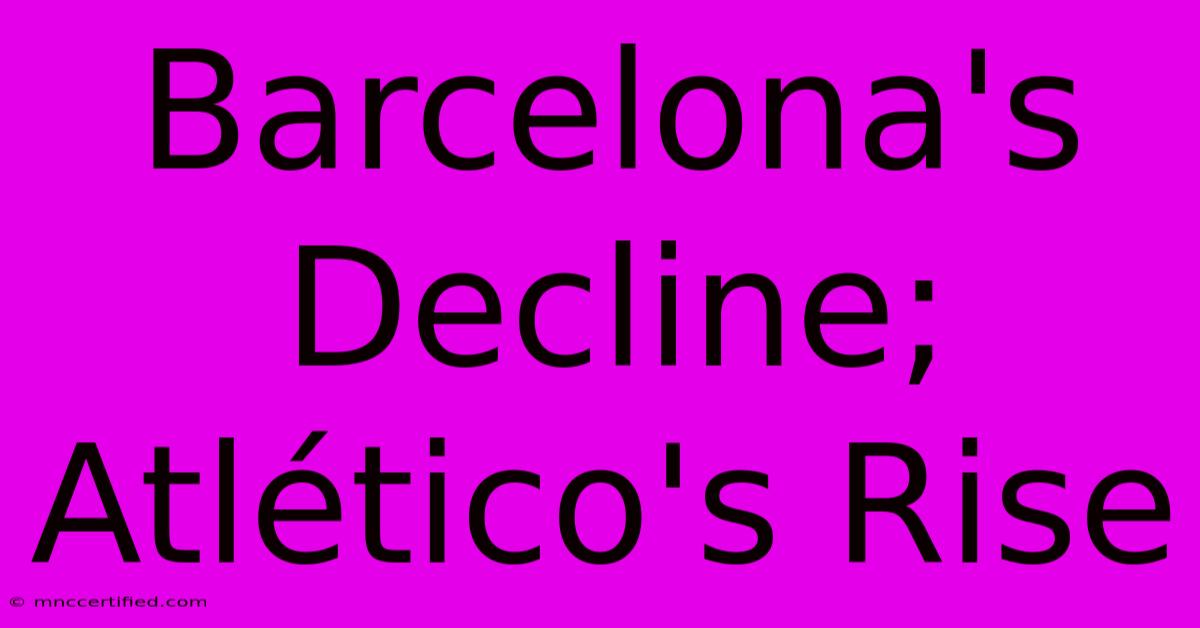Barcelona's Decline; Atlético's Rise

Table of Contents
Barcelona's Decline; Atlético Madrid's Rise: A Shifting Power Dynamic in La Liga
For years, FC Barcelona reigned supreme in La Liga, a titan seemingly invincible. Their dominance, punctuated by the mesmerizing brilliance of Lionel Messi, defined an era. However, the past few seasons have witnessed a dramatic shift in the Spanish football landscape, a decline in Barcelona's fortunes accompanied by the impressive ascent of Atlético Madrid. This article delves into the factors contributing to Barcelona's struggles and Atlético's remarkable rise, analyzing the on-field performances, off-field management, and broader economic influences shaping the modern Spanish league.
The Fall of the Catalan Giants: Unraveling Barcelona's Decline
Barcelona's decline isn't a sudden collapse but a gradual erosion of their once-unassailable position. Several interconnected factors have played crucial roles:
1. The Messi Departure and its Ripple Effect:
The departure of Lionel Messi in 2021 was undoubtedly a seismic event. More than just losing a generational talent, Barcelona lost their talisman, the player around whom their entire attacking strategy revolved. Replacing such an irreplaceable figure proved incredibly difficult, leaving a gaping hole in the team's creative and scoring capabilities. This loss had a cascading effect, impacting team morale and overall performance.
2. Financial Mismanagement and the Debt Crisis:
Barcelona's crippling debt has been extensively documented. Years of excessive spending, coupled with poor financial management, have left the club in a precarious financial situation, severely limiting their ability to attract top talent and hindering their capacity to compete with richer clubs. This financial instability directly impacts squad strength and long-term planning.
3. Tactical Challenges and Managerial Instability:
The post-Messi era has seen a succession of managers, each attempting to rebuild the team with varying degrees of success. The lack of consistent tactical identity and the frequent changes in management have prevented the club from establishing a clear playing style and building team cohesion. This managerial instability has further exacerbated the club's problems.
4. Aging Squad and Lack of Youth Development:
While Barcelona's youth academy, La Masia, has historically been a source of incredible talent, recent years have seen a decline in its output. The first team also suffered from an aging squad, with several key players past their prime, further hindering their ability to compete at the highest level. A lack of consistent investment in youth and a failure to adequately integrate young players into the first team have contributed to this problem.
Atlético Madrid's Ascent: A Model of Pragmatism and Efficiency
While Barcelona struggled, Atlético Madrid demonstrated a remarkable resilience and strategic prowess. Their success is built on a different foundation, emphasizing pragmatism, defensive solidity, and astute management:
1. Strategic Recruitment and Squad Depth:
Atlético's success stems from their shrewd recruitment strategy. They consistently identify and acquire talented players who fit their tactical system, often finding hidden gems or undervalued assets. This approach, combined with building squad depth, allows them to cope with injuries and maintain consistency throughout the season.
2. Defensive Prowess and Tactical Flexibility:
Atlético is renowned for their robust defense and organized midfield. Their defensive solidity provides a platform for their attacking players to thrive, and their tactical flexibility allows them to adapt their game plan to different opponents. This pragmatic approach has proven highly effective against various opponents, even those with superior individual talent.
3. Strong Leadership and Stability:
Unlike Barcelona's managerial carousel, Atlético has enjoyed greater stability under Diego Simeone. Simeone's long tenure has instilled a clear playing philosophy and fostered strong team unity and identity. This leadership stability has been instrumental in their consistent performance and success.
4. Financial Prudence and Sustainable Growth:
In contrast to Barcelona's financial struggles, Atlético has maintained financial prudence. Their responsible spending and focus on sustainable growth have allowed them to build a strong squad without incurring crippling debt. This financial stability provides a foundation for long-term success.
The Future of La Liga: A New Era Dawns
The decline of Barcelona and the rise of Atlético Madrid signify a notable shift in the balance of power in La Liga. While Barcelona faces a challenging period of rebuilding, Atlético's success serves as a blueprint for other clubs, demonstrating that a combination of strategic management, financial prudence, and tactical discipline can lead to sustained success, even against seemingly insurmountable odds. The future of La Liga remains dynamic, promising an exciting period of competition and change. The rivalry between these two clubs, once a clear dominance by one, now represents a fascinating and fiercely contested competition.

Thank you for visiting our website wich cover about Barcelona's Decline; Atlético's Rise. We hope the information provided has been useful to you. Feel free to contact us if you have any questions or need further assistance. See you next time and dont miss to bookmark.
Featured Posts
-
Arsenals 5 1 Win Over Palace
Dec 22, 2024
-
Blake Livelys Accusation Against Baldoni
Dec 22, 2024
-
Cwa Statement Social Security Fairness Act
Dec 22, 2024
-
Rose Bowl Matchup Oregon Vs Ohio State
Dec 22, 2024
-
Premier League Betting Tips And Dropped Points
Dec 22, 2024